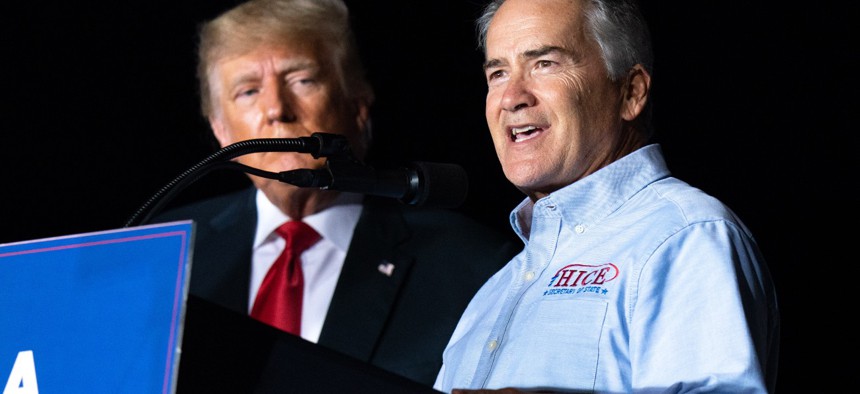
Rep. Jody Hice, R-Ga., speaks to the crowd during a rally as former President Donald Trump watches on September 25, 2021 in Perry, Georgia. Hice led a group of Republicans in introducing a bill to codify Trump workforce executive orders. Sean Rayford/Getty Images
Some House Republicans Want to Reinstall Trump Workforce Policies
A group of 12 lawmakers introduced a bill that would revive the former president’s anti-union executive orders and an order that could politicize the civil service.
A group of 12 House Republicans on Wednesday introduced legislation aimed at reinstating the bulk of former President Trump’s most controversial federal workforce policies, including anti-union measures and the politicization of policy-related jobs.
In 2018, Trump signed a trio of executive orders aimed at making it easier to fire federal workers and reducing the role of labor groups in federal agencies. Included were provisions shortening the performance improvement period to 30 days, exempting adverse personnel actions from grievance proceedings, shortening the length and reducing the scope of collective bargaining negotiations, and significantly reducing the number of work hours union members can spend on official time.
The official time order capped the amount of time a federal employee who is a union official can spend on representational duties, like meeting with employees and working on grievances and collective bargaining negotiations, at 25% of their duty time, and placed an agency-wide cap on official time at one hour per bargaining unit employee per year.
And in October 2020, Trump signed another order establishing Schedule F, a new job classification for so-called “confidential, policy-determining, policy-making or policy-advocating” positions and sought to remove career federal workers from the General Schedule, stripping them of virtually all of their civil service protections and making them essentially at-will employees. Although the Trump administration began efforts to reclassify jobs into Schedule F, they ultimately were unable to move any workers to the new job classification before Biden took office in January 2021, when he rescinded the Schedule F order, as well as the anti-union and federal firing edicts.
Just days after Trump, who is reportedly considering running for president again in 2024, told supporters at a South Carolina rally that in a second term, he would escalate his attacks on the nonpartisan civil service by making it so that the president can fire any federal employee for any reason, a group of House Republicans led by Rep. Jody Hice, R-Ga., introduced legislation that would reinstate these four executive orders.
The Accountable Federal Employees Act (H.R. 7095) simply establishes the provisions of Trump’s four workforce executive orders in federal law.
Hice said in a statement that he blames federal employee unions for making it too hard for agencies to discipline or remove poor performers and accused some feds in policy-related roles of being “insubordinate” toward political leadership.
“Americans are suffering at the hands of underperforming federal employees,” he said. “But unfortunately, Democrats have only sought to protect and reward inadequate job performance with bulletproof job security and a plethora of taxpayer-funded benefits rather than holding these employees accountable for their work. It’s time for Congress to ensure federal agencies meet their missions, and that starts with holding bureaucrats accountable to the American people. I’m proud to introduce the Accountable Federal Employees Act, which reins in the unelected, unaccountable federal bureaucracy and cements President Trump’s ground-breaking policies to address failing employees.”
With Democrats in control of the House and Senate, it is unlikely that the bill will advance, although it is clear that Republicans would consider returning to Trump’s approach to federal workforce issues if they return to power.







